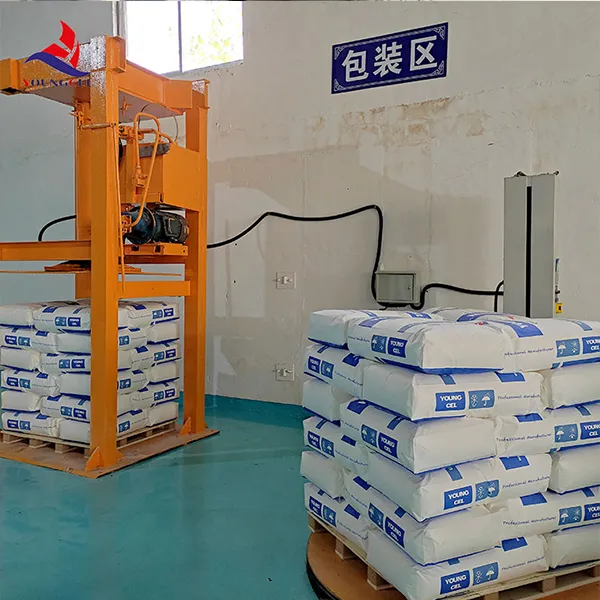Understanding HPMC A Versatile Polymer for Modern Applications
Hydroxypropyl Methylcellulose (HPMC) is a versatile and widely used polymer derived from cellulose, a natural polymer that forms the structural component of plant cell walls. HPMC has gained significant attention in various industries due to its unique properties and broad range of applications. In this article, we will explore the characteristics, uses, and advantages of HPMC, illustrating why it has become an essential material in today's technological landscape.
What is HPMC?
HPMC is a modified cellulose derivative, created through the chemical modification of cellulose fibers. The substitution of hydroxypropyl and methyl groups results in a polymer that exhibits enhanced solubility in water, increased viscosity, and improved film-forming capabilities. HPMC is available in various grades, offering different viscosity profiles and solubility characteristics tailored to specific applications.
Properties of HPMC
HPMC possesses several notable properties, making it an attractive option for industries ranging from pharmaceuticals to construction materials
1. Water Solubility Unlike many hydrophobic polymers, HPMC is soluble in cold water, forming a clear, viscous solution. This property is crucial for applications requiring easy formulation and processing.
2. Thickening Agent HPMC acts as an effective thickening agent in various formulations, allowing manufacturers to control the viscosity of liquids, which is essential in products like paints, coatings, and cosmetics.
3. Film-Forming Agent When dried, HPMC forms a flexible, transparent film, which is beneficial in drug delivery systems, food coatings, and packaging materials.
4. Biocompatibility Due to its non-toxic nature, HPMC is extensively used in pharmaceutical applications, such as drug formulations and controlled-release systems, making it safe for human consumption.
5. Stabilizing Agent In emulsions and suspensions, HPMC helps stabilize the formulation by preventing the separation of components, thus enhancing the shelf life and efficacy of products.
Applications of HPMC
hpmc 200000

HPMC finds utility across a myriad of sectors. Some key applications include
1. Pharmaceuticals In the pharmaceutical industry, HPMC is primarily used as an excipient in tablet formulations, capsules, and controlled-release systems. Its ability to form gels and films aids in drug delivery, ensuring that medications are released at the desired rate.
2. Food Industry HPMC is utilized as a food additive, enhancing texture and moisture retention in products like sauces, dressings, and baked goods. It acts as a stabilizer and an emulsifier, ensuring that food products maintain their quality during storage.
3. Construction In the construction realm, HPMC is employed in cement-based materials, adhesives, and paints. It improves the workability and adhesion of mortars while providing water retention, essential for proper curing of cement mixtures.
4. Cosmetics HPMC serves as a thickening agent in cosmetic formulations, such as lotions and creams. It provides the desired consistency while ensuring that products are easy to apply and spread.
5. Personal Care In personal care items, HPMC enhances the feel and texture of products like shampoos and conditioners, contributing to a pleasant user experience.
Advantages of HPMC
The advantages of HPMC over other polymers are numerous. Its non-toxic nature and broad spectrum of applications make it a preferred choice for industries prioritizing safety and performance. Furthermore, its ability to modify viscosity and stability across various formulations gives manufacturers the flexibility needed in product development.
HPMC is also more environmentally friendly compared to other synthetic polymers, as it is derived from natural cellulose sources. The biodegradability of HPMC minimizes environmental impact, aligning with the increasing shift towards sustainable practices in manufacturing and product formulation.
Conclusion
In summary, Hydroxypropyl Methylcellulose (HPMC) is a highly versatile polymer that plays a crucial role in various industries. Its unique properties and numerous advantages make it an ideal candidate for a wide range of applications, from pharmaceuticals to construction materials. As technology continues to evolve and the demand for sustainable solutions rises, HPMC is poised to remain a fundamental component in crafting innovative and effective products for modern society. The ongoing research and development surrounding HPMC will undoubtedly reveal even more potential uses, reinforcing its status as an indispensable material in today’s world.
-
A Comprehensive Guide to Methyl Ethyl Hydroxyethyl Cellulose: Applications and Industry InsightsNewsNov.24,2025
-
Understanding Methyl 2 Hydroxyethyl Cellulose: Uses, Benefits & Industry InsightsNewsNov.24,2025
-
Hydroxyethyl Methyl Cellulose HEMC: Industrial Uses, Benefits & Future TrendsNewsNov.23,2025
-
HEMC Cellulose: Versatile & Sustainable Industrial Polymer | YoungcelNewsNov.23,2025
-
Methyl Hydroxyethyl Cellulose: Versatile Building Block for Industry & SustainabilityNewsNov.23,2025
-
CAS 9032 42 2: Understanding Polyvinyl Alcohol's Impact on Industry & SustainabilityNewsNov.22,2025




